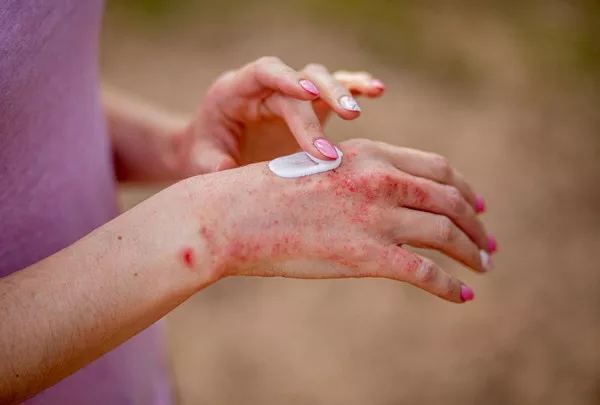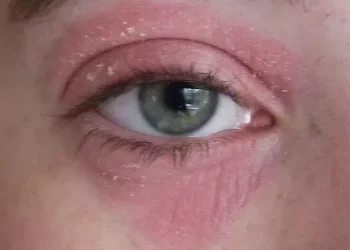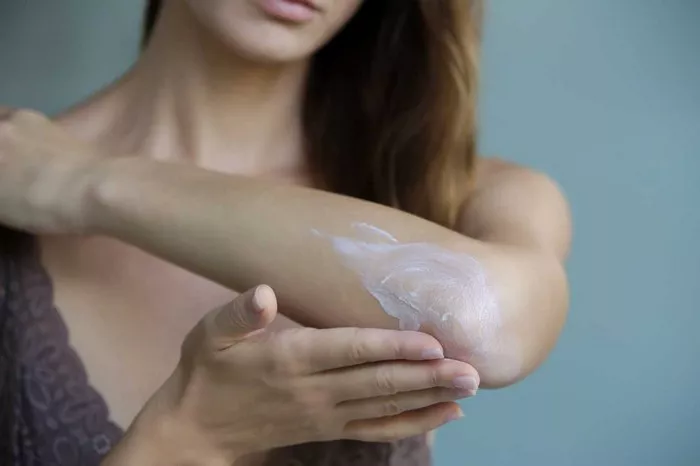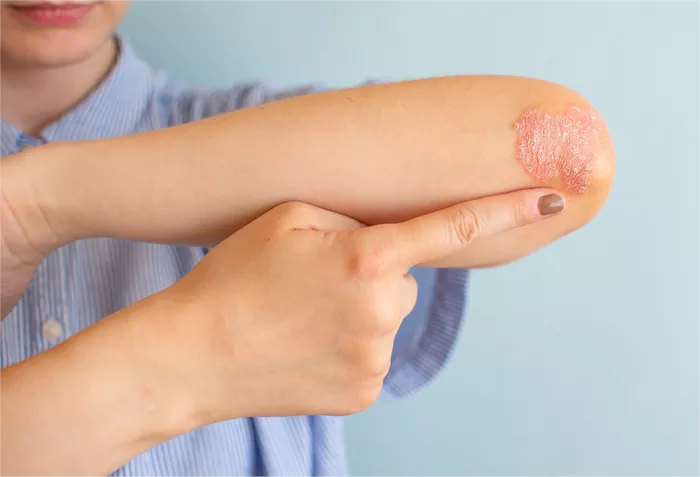Dyshidrotic eczema, also known as pompholyx, is a type of eczema that causes small, itchy blisters to form on the palms of your hands, fingers, and sometimes on the soles of your feet. This condition can be frustrating, painful, and even embarrassing. While there is no known cure for dyshidrotic eczema, there are several home treatments and lifestyle changes you can make to manage symptoms, reduce flare-ups, and soothe your skin.
This guide will provide you with natural remedies, over-the-counter treatments, and general tips to help you treat dyshidrotic eczema on your hands at home.
Understanding Dyshidrotic Eczema
Dyshidrotic eczema is characterized by the appearance of small blisters that typically appear on the sides of the fingers, palms, and soles of the feet. These blisters can be extremely itchy and may cause the skin to crack, peel, and become painful. The exact cause of dyshidrotic eczema is unclear, but several factors can trigger flare-ups, including:
Allergies: Certain foods, pollen, or animal dander.
Stress: Emotional or physical stress can worsen eczema.
Environmental factors: Exposure to chemicals, soaps, or weather conditions.
Genetics: Family history of eczema or other skin conditions.
Sweating: Excessive moisture and heat can irritate the skin.
Although there’s no cure for dyshidrotic eczema, effective management can make a significant difference in your quality of life.
1. Moisturizing Your Hands
One of the best ways to manage dyshidrotic eczema is to keep your skin hydrated. Dry skin can lead to itching, cracking, and irritation, making flare-ups worse. A good moisturizing routine is essential for managing symptoms.
Use fragrance-free moisturizers: Opt for thick, emollient-rich creams that lock moisture in, such as petroleum jelly or heavy-duty hand creams. Look for products that are free of fragrances and alcohol, which can irritate the skin.
Apply moisturizer immediately after washing hands: The best time to apply moisturizer is when your skin is still damp, as it helps to lock in moisture. Be sure to use a good moisturizer throughout the day, especially after washing your hands.
Overnight moisturization: You can apply a thick layer of ointment or cream to your hands before bed and wear cotton gloves to help the moisturizer penetrate the skin overnight. This will provide intense hydration and help prevent skin from drying out.
2. Soaking Your Hands in Cool Water
Soaking your hands in cool water can help soothe irritation, reduce inflammation, and relieve itching. This is particularly useful during flare-ups when your hands are itchy or painful.
Use a cool water soak: Fill a basin with cool water and soak your hands for about 15-20 minutes. You can add a few tablespoons of colloidal oatmeal to the water to calm the skin further.
Avoid hot water: Hot water can irritate the skin and make eczema worse, so always use lukewarm or cool water for soaks or when washing your hands.
3. Applying Wet Compresses
If your eczema is causing significant irritation or if you have open blisters, applying a wet compress can provide relief and help prevent infection.
Use a clean cloth or gauze: Soak a clean cloth or gauze in cool water (or water mixed with a soothing ingredient like chamomile tea or aloe vera juice) and place it on the affected areas of your hands.
Leave the compress in place for 15-20 minutes: This will help cool and hydrate the skin, reduce swelling, and calm irritation. Repeat this process two to three times a day, depending on how your skin feels.
4. Aloe Vera for Soothing Relief
Aloe vera is a well-known natural remedy for soothing irritated skin. Its anti-inflammatory properties can help reduce swelling and calm itching.
Fresh aloe vera gel: You can extract gel directly from an aloe vera plant by cutting open a leaf and applying the gel to your skin. If you don’t have access to a fresh aloe vera plant, you can purchase pure aloe vera gel from a pharmacy.
Over-the-counter aloe-based products: Look for creams or lotions that contain at least 90% aloe vera. Apply the product generously to the affected areas to help reduce inflammation and promote healing.
5. Coconut Oil for Moisturization
Coconut oil is another natural remedy that has been shown to help with eczema due to its antibacterial, anti-inflammatory, and moisturizing properties.
Apply virgin coconut oil: Use a pure, unrefined coconut oil and apply it to your hands multiple times throughout the day. It will help moisturize the skin and may also reduce the risk of infection in open blisters.
Overnight treatment: For an intensive moisturizing treatment, apply coconut oil to your hands before bed and cover them with soft cotton gloves. This will help your skin absorb the oil and heal more effectively.
6. Avoiding Known Triggers
Managing dyshidrotic eczema at home involves identifying and avoiding factors that can trigger flare-ups. Some common triggers include:
Harsh soaps and chemicals: Use mild, fragrance-free soap when washing your hands. Avoid exposure to harsh cleaning chemicals or detergents, as they can irritate the skin.
Allergens: If you know you have allergies, try to avoid allergens such as certain foods, dust, or pet dander, as these can worsen your eczema symptoms.
Heat and sweating: Dyshidrotic eczema is often aggravated by excessive sweating. Try to keep your hands cool and dry, especially during hot weather or strenuous activity. If your hands tend to sweat a lot, consider using absorbent cotton gloves to reduce moisture buildup.
7. Stress Management
Stress is one of the most common triggers for eczema flare-ups. Managing stress effectively can help reduce the frequency and severity of outbreaks.
Practice relaxation techniques: Activities such as deep breathing, meditation, and yoga can help reduce stress and improve overall skin health. Try to incorporate these activities into your daily routine.
Regular exercise: Regular physical activity can also help reduce stress. Aim for moderate exercise, such as walking, swimming, or cycling, which helps release tension and promotes overall well-being.
8. Using Over-the-Counter Treatments
In addition to home remedies, you may need to use over-the-counter products to help control symptoms and prevent flare-ups.
Hydrocortisone cream: A low-strength hydrocortisone cream (1%) can help reduce inflammation and itching. Apply a thin layer to the affected areas as directed by the package instructions.
Antihistamines: If itching is severe, oral antihistamines like diphenhydramine (Benadryl) can provide relief. However, these should be used sparingly and only for short periods.
Calamine lotion: Calamine lotion can help soothe itching and dry out blisters. It’s often used for short-term relief during flare-ups.
9. When to See a Doctor
While home remedies can provide relief, it’s important to see a healthcare professional if:
Your symptoms worsen or don’t improve: If your eczema continues to flare up despite trying home treatments, you may need stronger medications or prescription-strength creams.
You develop signs of infection: If the blisters become increasingly red, warm, or filled with pus, this could indicate a bacterial infection, and you’ll need medical attention.
You experience significant pain or swelling: If the symptoms become unmanageable or affect your daily activities, it’s a good idea to consult a dermatologist for more specialized treatment options.
10. Preventing Future Outbreaks
Once your eczema symptoms have been brought under control, it’s important to focus on preventing future outbreaks.
Continue moisturizing daily: Keep your skin hydrated even when you don’t have a flare-up to prevent future dryness and irritation.
Wear gloves when handling chemicals: If you need to clean or use chemicals, wear rubber gloves to protect your skin from irritants.
Avoid triggers: Stay aware of any personal triggers, such as stress or allergens, and try to minimize your exposure to them.
Conclusion
While dyshidrotic eczema can be a challenging condition to manage, there are plenty of home treatments that can help soothe the symptoms and keep flare-ups under control. By moisturizing your hands, avoiding known triggers, and using natural remedies like aloe vera and coconut oil, you can reduce irritation and improve your skin health. In addition, maintaining a stress-free lifestyle and incorporating daily care routines will help prevent future outbreaks.
If your symptoms persist or worsen, it’s always a good idea to consult a healthcare professional for advice tailored to your specific condition.
Related topics:



























